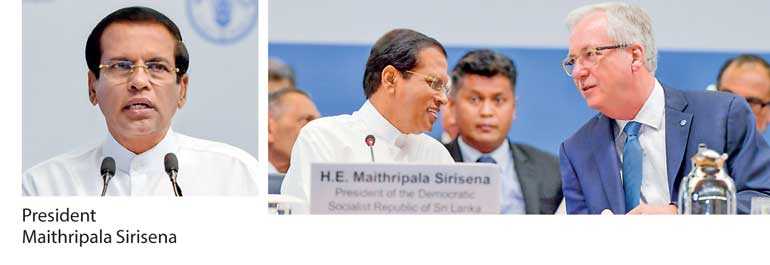Wednesday Feb 25, 2026
Wednesday Feb 25, 2026
Wednesday, 18 July 2018 00:00 - - {{hitsCtrl.values.hits}}

 President Maithripala Sirisena said that forests provide many socio-economic benefits, including food, energy and shelter, which are basic human needs. To sustain the products and services that help meet these and other needs, forests must be sustainably managed.
President Maithripala Sirisena said that forests provide many socio-economic benefits, including food, energy and shelter, which are basic human needs. To sustain the products and services that help meet these and other needs, forests must be sustainably managed.
Delivering the Inaugural Speech at the opening ceremony of the 24th Session of the Food & Agriculture Organisation’s (FAO) Committee on Forestry in Rome yesterday, President Sirisena said the Committee on Forestry (COFO) is the right platform for the forestry experts to share knowledge, discuss, debate and take decisions for the progression of the global forestry sector. “The agenda ahead of you is very comprehensive and challenging,” he told the international gathering.
He pointed out that more than 50% of the land area in Sri Lanka was covered by forests two centuries ago and now, the total dense forest cover of the island is estimated at 29.7% of the total land area of the country. He explained to them about the programs the Government has launched to enhance it to 32%.
He thanked the FAO for the assistance given to Sri Lanka and its people, especially during periods of national disasters, such as floods, drought and landslides, that caused much damage particularly to poor farming communities. He also thanked the FAO Director General for inviting him to address the opening of the session and described it as a great honour to Sri Lanka as well as to him, personally.
Given below is the full speech.
Director General of the Food and Agriculture Organisation of the United Nations, Excellencies, distinguished guests, ladies and gentlemen.
I wish to thank the Director General of the Food and Agricultural Organisation for inviting me to address the opening session of the 24th Session of the Committee on Forestry.
It is a great honour to Sri Lanka and personally, to me.
As the Minister of Agriculture, and later, as the Minister of Environment and Natural Resources as at present, I had a very intimate relationship with FAO.
And now, it is my turn to address this august assembly as the Head of State.
I deeply appreciate and thank FAO for the assistance given to my country and its people, especially during periods of national disasters such as the floods, droughts and landslides that occurred causing much damage, especially to poor farming communities, by providing them with urgently required food and provisions.
Ladies and Gentlemen, coming back to the subject of this session, a majority of the people in my country depend on agriculture for their livelihood.
A couple of centuries ago, it was estimated that more than 50% of the land area in Sri Lanka was covered by forests. And now, the total dense forest cover of the island, excluding other forms of vegetation, is estimated at 29.7% of the total land area of the country.
Sri Lanka is now highly committed to conserving its existing forest cover, to enhancing it to 32% by adopting better practices, and to improving land governance as a key measure to achieve the SDG target.
More than 50% of the forest cover in my country was lost due to clearing of forests to be used for export-oriented agriculture and large agricultural land settlements.
Forest destruction has caused severe environmental hazards in many parts of the country. It has affected rainfall patterns, soil erosion and destruction of agricultural products.
Forests also provide many socio-economic benefits, including food, energy and shelter, which are basic human needs. To sustain the products and services that help meet these and other needs, forests must be sustainably managed.
Reforestation has been the responsibility of the Forest Department. With the coordination of many other government ministries, local government institutions and cooperative societies, we have commenced a project to plant five million trees by 2020.
Currently, Sri Lanka has approximately 4.3 million children attending schools. We are commencing a project under the sponsorship of the Government to motivate and encourage the school children to plant at least one tree in their home gardens, school premises or wherever possible. We will help and support the plant growth by helping the children financially. We will allocate it to them by their personal name. We will persuade them to plant trees that could bring some income to the children and the households. This will encourage them and make the children aware of their duty to conserve and preserve nature.
In order to conserve the environment and the waterways the Government banned felling trees of over 5000 ft elevation.
Mega or even medium level projects should conduct environmental impact assessments before commencing activities.
I am aware that the Committee on Forestry is the right platform for you to share your knowledge, and discuss, debate and take decisions for the progressing of the global forestry sector. The agenda ahead of you is very comprehensive and challenging.
Ladies and Gentlemen, before I conclude, I wish to congratulate and thank FAO for the warm welcome to me and my delegation.
Thank you.